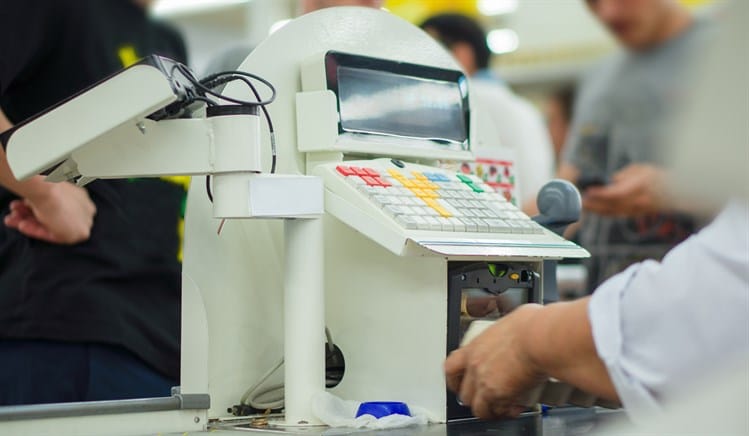Answer these simple questions and we will find you the BEST prices
Which type of solar quotes do you need?
It only takes 30 seconds
100% free with no obligation

Get up to 4 quotes from our selected suppliers by filling in only 1 form

Save money by comparing quotes and choosing the most competitive offer

Our service is 100% free and with no obligation
- Market-Inspector.co.uk
- EPOS Systems
- ePOS Software
EPOS Software
Electronic Point of Sale Software
EPOS systems, derived from POS systems, refer to electronic Point of Sales systems. They take over functions of cash register and other business processes. ePOS system have two essential components: hardware and software.
Hardware would typically consists of cash register, PC/ tablet and receipt printer. There might be some other peripheral solutions included such as barcode scanner, weighing scales, and other depending on your business.
EPOS software usually work on operating systems such as DOS, Windows, iOS, Linux, Unix and Android depending on the chosen ePOS or mPOS (mobile point of sale) system.
Are you considering to implement an ePOS software? If you need professional advice for choosing the most suitable ePOS software for your business, just fill out the form. You will receive free non-binding quotes tailored to your requirements.
Types of ePOS Software
There are different types of ePOS software from which you can choose. Depending on your budget and business needs, you can choose from:

- Open source ePOS software - free or paid
- Specialised ePOS software for your business
- mPOS software
Open Source ePOS Software
Open source ePOS software offers many possibilities. While free versions offer a solution for smaller business, paid versions offer full customisation and technical support to the given business; this might be advantageous for niche businesses.
Open source ePOS systems usually do not come with hardware, therefore hardware purchases should be considered in addition to open source software. Technical skills are needed for implementation and installation of these solutions.
The main advantages are the price or the possibility of customization. Disadvantages are that there is no 24/7 support and quality of the software and support may vary depending on the code, online forums and official webpages.
Specialised ePOS Software
There is specialised ePOS software for different kinds of businesses. Most typical software is for pubs, cafés, retailers, and restaurant POS systems. This software can come with hardware, therefore this solution is easier when you consider buying also hardware.
The advantage of specialised ePOS software is that they will fit your business well. There are features that fit the given business such as table management for restaurants and clothes matrix for retailers. It is usually possible to purchase hardware alongside this software, which might be convenient. This solution however, has the disadvantage of being more expensive than other choices.
MPOS Software

MPOS software is in practise an application, which is downloaded to a mobile device. This solution is often chosen by smaller retailers as it is cheaper, due to hardware solution and it offers more flexibility.
The number one advantage of mPOS is that it is cheaper, as only mobile device - tablet or a smartphone, is needed. Other advantage is that mPOS software offers flexibility - no need for fixed checkout spots and card payments do not have to processed in one place - solving the problem of exhibitions, trade fairs are other events and places outside of a physical shop.
The disadvantage is that mPOS solution, just like any device connected to the Internet is susceptible to viruses and threats, putting data in danger. However this can be avoided by having antivirus software, updating the device, downloading only legitimate apps and keeping the device locked.

EPOS Software Prices
There are different ways of paying for an ePOS software:
- Free software
- Upfront payment
- Monthly payment
Free software is usually open source, but also some software for mPOS solutions are free. The quality of software should be checked, just like offered support and its compatibility with hardware before deciding to go with this solution.
Upfront payments are more common among specialised software and mPOS providers. Upfront payments are usually a big investment to be paid once and therefore it is not a popular way of pricing. Although it might be an issue to pay upfront, in the end it might cost less than monthly payments.
Monthly payment is the most popular solution, as there are no high upfront costs. Monthly payments can be paid per user or per register. This solution might be more flexible when business owner chooses to update or switch provider.
Additional costs
Some ePOS solutions might offer some features only after paying extra money and it is good to know beforehand, as some features that are being charged for might be essential for business.

Service and support from ePOS providers might and might not be for free. Therefore it is good to know what kind of support is offered by chosen ePOS provider and to know what kind of support you might need in the future.
Upgrades and updates might be an additional cost as well, depending on provider. Some providers offer free updates, some charge every update. Card processing might also result in additional costs.
Hardware will be an additional cost. With mPOS solution, hardware will be cheaper (only tablets or smartphones are needed), with open source and specialised ePOS, hardware will be more expensive. Therefore, the cost of the hardware should be included into any consideration.
How to Choose the Right ePOS Software?
Research is very important step in buying a new ePOS software. You should also consider your business needs, budget, needed hardware, support and service. Many providers offer demonstrations of chosen ePOS solution, which might help you decide.
Fill out our form and will receive free quotes from our suppliers. It will allow you to compare prices and see which solution suits your business the best.
We strive to connect our customers with the right product and supplier. Would you like to be part of Market Inspector?

